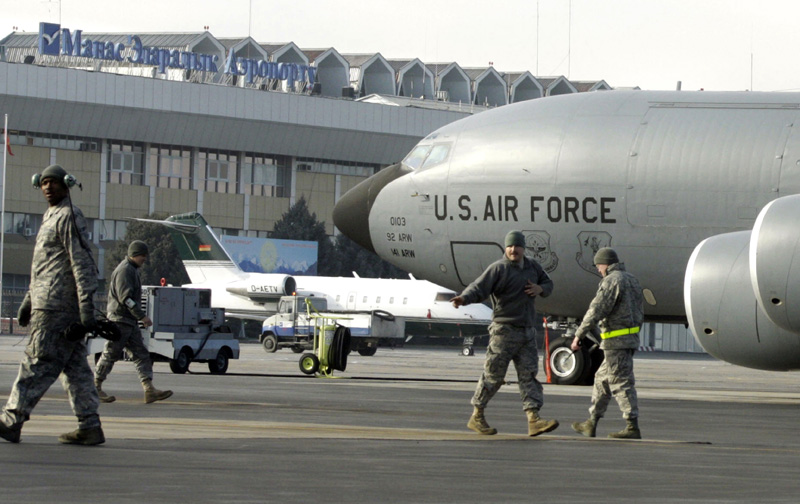
DoD Renews Contract on Manas
Publication: Eurasia Daily Monitor Volume: 7 Issue: 201
By:

After months of deliberations, on November 3, the US Defense Department (DoD) renewed its collaboration with Mina Corp Ltd., which has supplied jet fuel to the US Transit Center Manas in Bishkek for the past six years (https://www.defense.gov//News/NewsArticle.aspx?ID=61543). A one year $315 million contract allows Mina Corp to supply 96 million gallons of fuel to Manas. The contract can also be extended for another year.
DoD-Mina Corp collaboration continues despite allegations that the Gibraltar-based company previously worked closely with the ousted President Kurmanbek Bakiyev’s regime. Specifically, Mina Corp was reportedly in close collaboration with Bakiyev’s son Maksim, who owned most fuel contractor firms in Kyrgyzstan. Currently residing in the UK, Maksim is under investigation by Interpol and the Kyrgyz government for allegations involving large-scale corruption.
Following the violent collapse of the Bakiyev regime last April, both Kyrgyz and US observers expected that the DoD would change its contractor in Kyrgyzstan to avoid any repetition of a scenario where an authoritarian leadership benefits from supplying fuel to Manas to a US government funded contractor. Meanwhile, Mina Corp denies any allegations that it knew about corruption in the Kyrgyz government related to jet fuel contracts (www.golosameriki.us, May 25).
Together with the British fuel company Red Star Enterprises Inc., Mina Corp has been supplying fuel for Manas for six years; during this period, its contacts with the US Federal Government amounted to roughly to $1 billion. The DoD re-bid the contract shortly after the US Congress initiated a probe into the firm’s activity in Kyrgyzstan. Congressional hearings, as well as numerous other experts, have pointed out that funds for fuel supplies to Manas may have allowed the Bakiyev family to strengthen its grip over the Kyrgyz economy. Numerous experts have also alleged that fearing the loss of this key ally in the war in Afghanistan, the White House has turned a blind eye to widespread human rights abuses in the country (www.kommersant.ru, May 4).
Following the April regime change no major political party or leader has openly challenged the US Transit Center’s presence. Even Moscow’s most ardent supporter, the head of the Ar-Namys Party and former KGB officer, Felix Kulov, has only requested that the Manas center comply with the requirements of the Russian-led Collective Security Treaty Organization (CSTO) (www.golosameriki.us, October 8). Furthermore, several Kyrgyz politicians have highlighted that Manas represents a vital source for the national budget and Kyrgyzstan cannot afford to lose it. With no strong opposition against Manas, it seems like the issue will not be contested in the newly elected parliament.
To a large extent the future of Manas depends on whether Washington and Moscow will continue friendly collaboration in Central Asia and specifically in Kyrgyzstan. Since US-Russian relations or any other aspect in US foreign policy was not part of any of the contesting candidates’ electoral campaigns in the run up to November 2 midterm elections, it is difficult to predict exactly how the midterm elections results will impact on the “reset.” Whether the new power balance in the US Congress following the elections will serve to obstruct the US-Russian “reset” is also unclear.
To date, Kyrgyzstan’s domestic instability presented an opportunity for the US and Russia to further explore the “reset” and find common ground for post-conflict assistance. US-Russian collaboration in the aftermath of the ethnic violence last June is often cited as a showcase of improving relations between the former rivals. Russian influence in Kyrgyzstan is, however, still widely present. According to Kyrgyz experts, Moscow has been meddling in the parliamentary coalition formation (www.akipress.kg, November 3). There is a strong possibility that a coalition between Social Democratic Party, Respublika, and Ata-Meken might emerge. Unlike their competitors (Ata-Jurt and Ar-Namys), all three parties support a parliamentary system of governance. Yet, the coalition is reportedly under Russian pressure because Ata-Meken is the only party disinterested in deeper collaboration with Russia. The party’s leader, Omurbek Tekebayev, has been the focus of Russian media attacks, most likely due to his support of Kyrgyzstan’s collaboration with the West.
Since the removal of Bakiyev, President Roza Otunbayeva has tried to increase transparency in governance. The possibility of engaging Russian fuel supply companies in the equation has been part of this effort. The new government has also considered the idea of launching a special website to track foreign contracts regarding the Manas base to avoid the emergence of a Maksim-type corrupt fuel deal. However, whether such transparency initiatives in relation to fuel supplies to Manas will be carried out remains to be seen.




